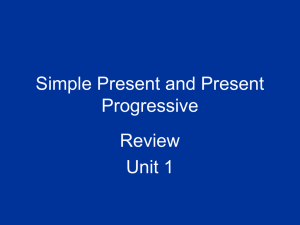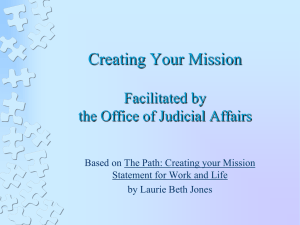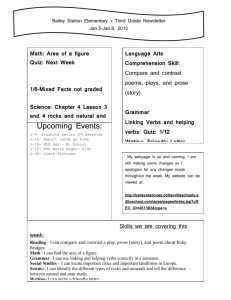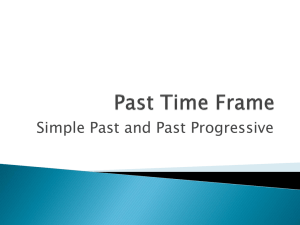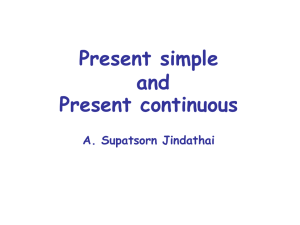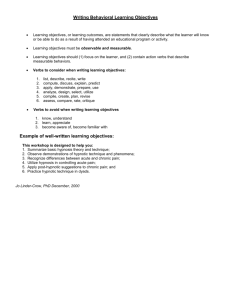Morphosyntax 3 – Lecture 7 – Progressive aspect
advertisement
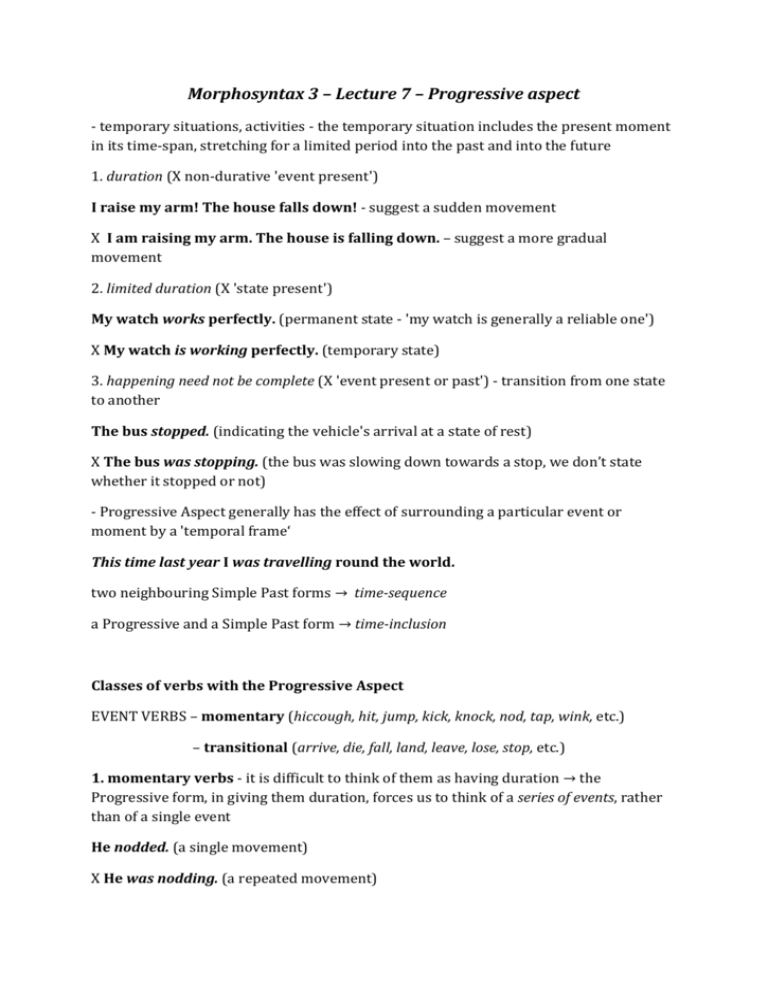
Morphosyntax 3 – Lecture 7 – Progressive aspect
- temporary situations, activities - the temporary situation includes the present moment
in its time-span, stretching for a limited period into the past and into the future
1. duration (X non-durative 'event present')
I raise my arm! The house falls down! - suggest a sudden movement
X I am raising my arm. The house is falling down. – suggest a more gradual
movement
2. limited duration (X 'state present')
My watch works perfectly. (permanent state - 'my watch is generally a reliable one')
X My watch is working perfectly. (temporary state)
3. happening need not be complete (X 'event present or past') - transition from one state
to another
The bus stopped. (indicating the vehicle's arrival at a state of rest)
X The bus was stopping. (the bus was slowing down towards a stop, we don’t state
whether it stopped or not)
- Progressive Aspect generally has the effect of surrounding a particular event or
moment by a 'temporal frame‘
This time last year I was travelling round the world.
two neighbouring Simple Past forms → time-sequence
a Progressive and a Simple Past form → time-inclusion
Classes of verbs with the Progressive Aspect
EVENT VERBS – momentary (hiccough, hit, jump, kick, knock, nod, tap, wink, etc.)
– transitional (arrive, die, fall, land, leave, lose, stop, etc.)
1. momentary verbs - it is difficult to think of them as having duration → the
Progressive form, in giving them duration, forces us to think of a series of events, rather
than of a single event
He nodded. (a single movement)
X He was nodding. (a repeated movement)
2. transitional verbs – the Progressive indicates the approach to a transition, rather
than the transition itself
The bus was stopping.
3. activity verbs (drink, eat, play, rain, read, run, talk, watch, work, write, etc.) - refer to a
continuing, though time-limited, activity (something is 'going on‘):
'What are you doing?' 'I'm writing a letter.'
4. process verbs (change, develop, grow, increase, learn, mature, slow down, widen, etc.) a process of change usually has duration, but not indefinite duration:
The weather is changing for the better.
Anti-progressive verbs
to be: He is ill (state present) X ?*He is being ill.
BUT many anti-progressive verbs can occur with the Progressive Aspect in special
contexts
- Anti-progressive verbs include:
5. verbs of inert perception (feel, hear, see, smell, taste)
I could hear/heard a knocking at the door.
X *I was hearing a knocking at the door.
→ the could form denotes a state, whereas the Simple Past form denotes an event:
I could hear a door slamming (all night). (a continuing and repeated noise)
(At that moment) I heard a door slam. (a single moment of impact)
6. verbs of inert cognition (believe, forget, guess, think, imagine, know, suppose,
understand, etc.)
I believe in fair play.
(*I am believing in fair play.)
Feel, see and hear, in addition to being 'verbs of perception‘ can be used as verbs of
cognition:
We feel (= it is our feeling or opinion) that you have so much to offer (not *We are
feeling. .., etc.).
I see your point.
I hear Kate is engaged to Jack.
7. verbs of attitude (including volition and feeling) (hate, hope, intend, like, love, prefer,
regret, want, wish)
She loves working on a farm.
- some of these can more easily occur in the Progressive - enjoy, hope, like, love - if the
emphasis is on temporariness or tentativeness
Tim, are you wanting any fruit?
8. state verbs of having and being (be, belong to, contain, consist of, cost, depend on,
deserve, have, matter, own, resemble, etc.)
This carpet belongs to me. (*This carpet is belonging to me.)
9. verbs of bodily sensation (ache, feel, hurt, itch, tingle, etc.)
- when referring to a temporary state, they can occur either with or without the
Progressive with no difference in meaning:
I feel great. = I'm feeling great.
My knee hurts. = My knee is hurting.
! feel (internal sensation) X feel (verb of perception denoting external sensation):
I feel/am feeling great. X I can feel a stone in my shoe.
= multiple membership
Other examples of multiple membership
1. verbs in class 5 (feel, taste and smell) - 'inert perception', but also 'active perception'
(Class 3)
I (can) smell the gas. X I'm smelling the perfume. It's splendid!
Class 5’s see and hear are not used in the active sense, because the separate verbs look
at and listen to are available for that function:
I (can) see a bus in the distance. X I'm looking at a bus in the distance.
I (can't) hear what he's saying. X You're not listening to what he's saying.
2. verbs in class 6 (inert cognition) – in progressive show the activation or arousal of
thought processes
Surely you're imagining things!
3. verbs in class 6 and 7 (inert cognition and attitude) – we can use the Progressive for
politeness reasons
I'm hoping you'll give us some advice.
4. verbs in class 8 ('state verbs of having and being') can combine with the Progressive
Aspect where an 'activity' meaning can be supplied
She is being kind. (She is acting kindly towards someone)
X She is kind. (It‘s her characteristic that she‘s kind)
Certain other verbs in class 8 can take the Progressive when accompanied by an
expression like more and more:
He is resembling his father more and more as the years go by.
Progressive Aspect: other uses
1. habit in existence over a limited period: I'm taking dancing lessons this winter.
2. repetition of events of limited duration: Whenever I pass that house the dog's
barking.
3. Progressive Present may refer to anticipated happenings in the future (like Simple
Present) (futurate progressive): Martin is coming over for lunch on Sunday.
4. persistent or continuous activity (absence of the 'temporary' element of the normal
Progressive meaning): The western land mass is always moving towards the water.
- always, continually, constantly and for ever (or forever)
I'm continually forgetting people's names.
He's always giving her expensive presents. - might have a tone of irritation, criticism
